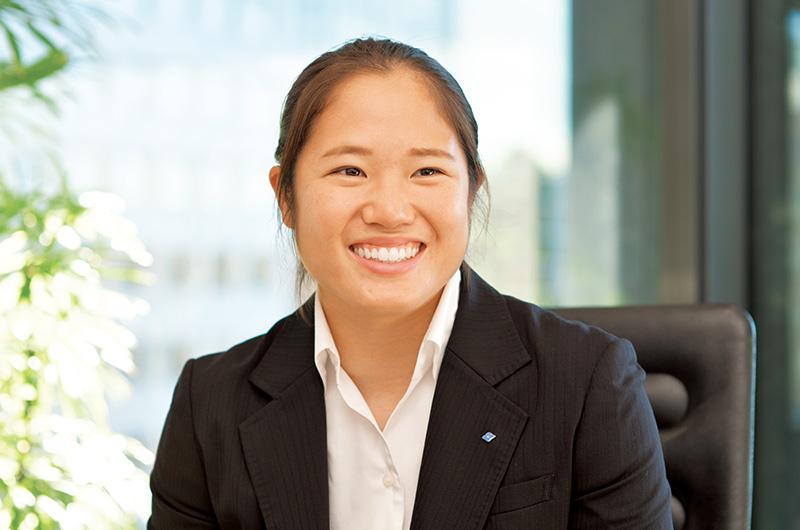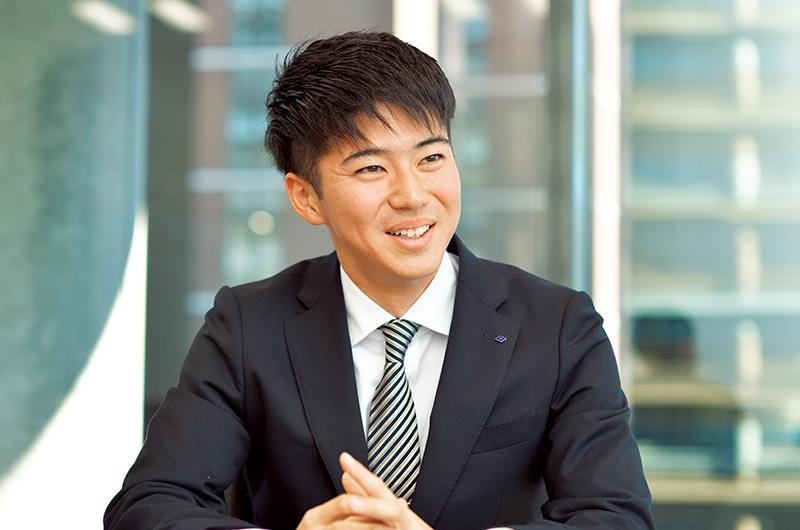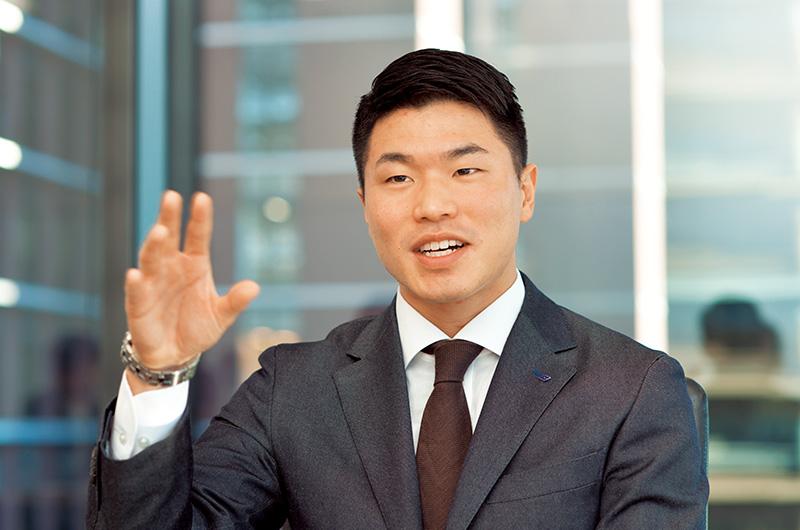

The Sumitomo Electric Group has long been committed to the promotion of sports, thereby producing athletes who compete in the global arena.
In this volume, Yuki Koike and Shuhei Tada of Sumitomo Electric, who are drawing considerable attention as talented sprinters, and Yuki Ito of Sumitomo Wiring Systems, who underpins the Japanese women’s rugby team as one of its key players, candidly discuss how they have thought and acted so far as athletes competing in the global arena. Although the immediate target of the three athletes is to qualify for the games, they are striving to go further and win medals by accelerating their efforts to raise their levels as athletes.
Rugby Players Striving to Score Tries through Teamwork, and Track & Field Athletes Aiming to Achieve Desired Results on Their Own – Each Sport’s Attractive Features
—— What made you start your sport and what attracted you to it?
Ito:
I have a brother who is two years older than me, and I’ve been greatly influenced by him. Actually, I began practicing judo at the age of four, and that was because I wanted to give it a try after observing lessons of my brother’s judo class. While practicing judo, I also continued to do classical ballet and gymnastics. After I entered junior high school, I began to concentrate fully on judo as a member of the school’s judo club. There were very strong judo athletes at the national level, and I was seldom able to advance to the finals in competitions. But I’m very competitive by nature, and I continued to practice until I finally won second place in the 48 kg category of a national junior high school competition, which was the final event that I participated in in my junior high school days.
Koike:
I also have an elder brother, but he played soccer. Unlike Ms. Ito, I wanted to do something different from him. I would often play catch with my father, leading me to start playing baseball when I was an elementary school student. Afterwards, I joined the local baseball club. This experience of participating in a new community made me aware of competing with others, and winning and losing games. When I entered junior high school, I joined the school’s baseball club. I finally played as the ace and cleanup hitter of my team, but we did not qualify for the Hokkaido prefectural competition, and I retired in the summer of my third year at junior high school. I continued practicing earnestly without taking a day off, but this was simply because I enjoyed myself, as baseball made my three years at junior high school truly fulfilling.
Tada:
When I was an elementary school student, I played soccer and did swimming, but most of all, I loved running. On field days, I volunteered to compete in running races and I loved finishing first. I began my track and field career at junior high school, and competed in inter-high school championships. I’m about the same age as Mr. Koike, but he was already well known in those days. My turning point came when I was a university student and I had the opportunity to think about my training menu on my own. This led me to work on muscle reinforcement, which I had not focused on so much, and also on improving my running style by taking advantage of my strong point, my jumping ability. Consequently, my record improved by 0.4 or 0.5 seconds (for the 100 m) compared to my high school days. I made rapid progress. After graduating from university, I joined Sumitomo Electric, expecting that I could practice track and field in the excellent environment of the company, representing the Kansai region. Ms. Ito, you used to practice judo and changed your sport to rugby, while Mr. Koike, you used to play baseball and then moved to track and field. What lay behind these changes for each of you?
Ito:
I was again influenced by my brother. He played rugby at his high school. Watching him play, I simply thought it would be fun to play rugby, and I felt like giving it a try. I went to Fukuoka Chikushi High School, a prefectural high school famous for its strong rugby team, although it was a boys’ rugby team. Since the school did not have a girls’ rugby team, I trained together with the boys and belonged to a local club team. Rugby is particularly compelling in that all the team members share the same goal of scoring tries and that each player fulfills his/her own role to score a try. I joined Sumitomo Wiring Systems in 2019. Currently, I belong to Mie Women’s Rugby Football Club Pearls, the local rugby club team whose main sponsor is Sumitomo Wiring Systems.

Yuki Ito
Belongs to the Administration Division of Sumitomo Wiring Systems. Born in 1996 in Fukuoka. Continued to practice judo until she became a high school student, and won second place in the 48 kg category of a national junior high school competition. After graduating from junior high school, went on to Chikushi High School, a prefectural high school renowned for its strong rugby team, despite invitations from high schools with strong judo teams. Started her career as a rugby player and trained together with male students. After graduating from high school, enrolled at Nippon Sport Science University. Competed in the World Cup Ireland qualification rounds for the Asia and Oceania zone in 2017 and contributed to the team advancing to the final round. Joined Sumitomo Wiring Systems in 2019 and participated in Mie Women’s Rugby Football Club Pearls, the women’s rugby team in Mie Prefecture. Selected as a second candidate for the Japanese team of women’s seven-player rugby for the Tokyo Olympic Games. Plays as a forward and boasts excellent defense skills and hard work.
Koike:
I thoroughly enjoyed playing baseball during my three years at junior high school. After entering high school, I wanted to try something that would be not only fun but also challenging, and where I could demonstrate some achievements. My physical ability was high but I knew I was clumsy, so I wanted to try a sport that did not require any equipment and allowed me to compete simply with my body. As a result, I chose a non-team sport, track and field. In my first year of high school, I qualified for a competition for the first time, and my record for the 100 m was 10.99. Actually, I didn’t know that it was a good time until people around me told me so, showing how little I knew about track and field when I just began the sport. Since then, I’ve been running the 100 m and 200 m sprints. One of the attractive points of sprinting is that the results are presented clearly in figures. In a race, you’re not hindered by the other runners, meaning that the race result is totally up to you. You have to demonstrate everything you have, and this determines whether you win or lose. I think this clarity suits my taste.
Tada:
I agree. All the results are presented in figures. Working hard is the only way to generate good results. Track and field is a sport in which players cannot blame anyone but themselves for a poor performance, and this is part of the attraction of the sport. In addition, the race results are delivered in an extremely short time despite the considerable amount of time spent preparing for the race, and this point is also attractive.
So, both of you used to play different sports from what you do now. Do you feel that the experiences were useful to you in your current careers?

Shuhei Tada
Belongs to the Administration Division of Sumitomo Electric. Born in 1996 in Osaka. Began track and field in his junior high school days. After enrolling in Kwansei Gakuin University, achieved a victory in 2015 in the Kansai Region Inter-College Athletics Championships, while still a first year student. Achieved a victory again in the following year’s championships, setting a new championship record. Selected as a member of the Osaka Dream Program by the Osaka Association of All Athletes in 2017 to participate in a competition held in the U.S. Competed in the 100 m at the Golden Grand Prix Kawasaki held in the same year. Also competed in the 100 m and the 4 x 100 relay of the Japan Student Individual Championships of Athletics, and won the silver medal in the relay. At the 2018 Kansai Region Inter-College Athletics Championships, became the first athlete in 55 years to win a fourth straight victory in the 100 m. After graduating from university in 2019, joined Sumitomo Electric. Represented Japan at the 2019 World Athletics Championships, ran the first leg of the 4 x 100 m relay, and contributed to winning the bronze medal.
Ito:
Both rugby and judo are contact sports and have some points in common. In terms of how to use my body, such as how to hit a player of the other team and how to release my power, my experience of judo has been beneficial. But the decisive difference between judo and rugby is that while the former is a non-team sport, the latter is a team sport. I feel that rugby has many elements that are different from judo, especially when it comes to realizing the goal of scoring tries.
Koike:
In contrast to Ms. Ito, my experience of playing baseball was a disadvantage to me. When running between bases in a baseball game, you need to use the front sides of your muscles, including your leg muscles. In the case of track and field, however, you need to use the backsides of your muscles. I had difficulty eliminating my running habit that I had developed while playing baseball. In addition, while playing baseball, you need to run in such a way as to frustrate the other team’s players, such as when running to steal a base. In track and field, however, you need to run straight without trying to frustrate anyone. The basic approaches are quite different, which required me to develop a new mindset and adopt a new training method for track and field.

Yuki Koike
Belongs to the Human Resources Development Department of Sumitomo Electric. Born in 1995 in Hokkaido. Began to devote himself fully to track and field after enrolling in high school and soon demonstrated his talent in his first year. Drew public attention for his rivalry with Yoshihide Kiryu, of the same academic year. Obtained the title in the 100 m at the Japan Junior Championships in his third year of high school. After graduating from high school, went on to Keio University and experienced an international competition for the first time by competing in the World Junior Championships when he was a freshman. Became the third Japanese runner to advance to the finals of the 200 m and won the silver medal. After graduating from university, joined All Nippon Airways Co., Ltd. and then transferred to Sumitomo Electric. Became the third Japanese to run in the 9-second range (9.98) at the finals of the 100 m of the IAAF Diamond League London in July 2019.
Raise Your Awareness to Break through the Barrier into the Global Arena
—— All of you are striving to achieve success in the global arena, but how do you actually feel about standing in the global arena?
Tada:
I joined the 2017 World Athletics Championships, which was my first appearance in the global arena. I competed in the 100 m and the 4 x 100 m relay, but I just felt how high the barrier to the global arena was. In case of the 100 m, for example, Japanese athletes are able to run like their foreign rivals in the first half of the race, but end up by being overtaken in the second half. This was very shocking to me at first, because I found myself being overtaken by runners who had already begun to slow down their pace. It was like something that was happening in a different dimension. In those days, I had already achieved good results in races held in Japan, but my experience in international championships made me aware that I could never allow myself to become conceited, and stimulated my motivation to make even greater efforts to beat world-leading athletes.
Koike:
Many Japanese sprinters feel what Mr. Tada has expressed. Actually, Japanese and foreign athletes differ in terms of their mindset and awareness regarding short-distance running. In the case of the 100 m, for example, it has long been typical for Japanese sprinters to compete well in the first half of the race but be defeated in the latter half. This is because Japanese athletes regard the first 60 m as the first half of the race and place their focus on the initial spurt. Some foreign athletes joke that Japanese athletes are always practicing making their start. Such foreign athletes don’t care so much about making a good start and think that it’s OK as long as they don’t fail. Believing that the key lies in the final 60 m, they try to reach their top speed around the 70-m mark, where Japanese sprinters have usually already slowed down their speed. I’ve begun to try to run like a foreign sprinter, because I think that without this approach, it would be impossible to win a medal.
Ms. Ito, you’re also competing in the global arena, how do you feel about it?
Ito:
Japanese women’s rugby faces a huge gap with the rest of the world. Players from New Zealand, Australia and other strong countries are superior to their Japanese counterparts in terms of body size, speed, technique, etc. When competing against teams from the world’s top four countries, New Zealand, Australia, the U.S. and Canada, we are defeated by a considerable margin. We can’t score tries, and once the ball is intercepted by the other team, they quickly score a try. Currently, we’re competing in the World Series, but we keenly realize each time that there is a high barrier to entering the global arena.
Mr. Koike, what do you think you need to do in order to achieve success in the global arena?
Koike:
Although rugby and track & field are different, it’s important to set your standards at a higher level. I used to limit myself by thinking that the best thing I could do was to advance to the finals, but this approach was not correct. I need to raise my awareness as an athlete and set my target on winning a medal. On top of changing my awareness in this way, I need to directly experience the techniques of the world’s top-level athletes and raise the level of my own technique so that I can equal them, thereby achieving a breakthrough. I believe that dreams and targets are different. While dreams are things you can talk about as you like, targets are things that you need to accomplish in reality. My dream is to win the gold medal in a global competition someday, but my target is to win any medal. And to do so, it’s important to maintain my awareness at a high level.
Tada:
Now, Mr. Koike, you talked about the importance of setting a target and actually accomplishing it, and I agree with you. Since my high school days, I have placed my focus on setting a high target, considering what I needed to do to achieve it, and actually doing it. If you continue to accomplish small targets, you will finally be able to achieve a big target. Accordingly, as indicated by Mr. Koike, it is essential to maintain a high level of awareness.
Ito:
Honestly speaking, the Japanese women’s rugby isn’t strong enough to win a medal yet and hasn’t reached the level of competing equally with strong teams around the world. Our target is to reach the quarter finals in an international competition, such as the World Series, but we haven’t achieved it yet. Under this circumstance, we focus on every single training day by clarifying what we need to do. Another important element is that rugby is a team sport and the relationships between the team members are crucial. Some members are not selected for matches, but if this creates a bad atmosphere in the team, it negatively affects the matches. In order to compete in the global arena, it is also essential for team members to be considerate of one another and strongly unite themselves as a team.

